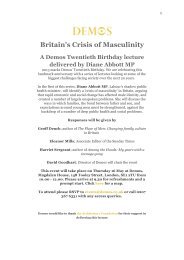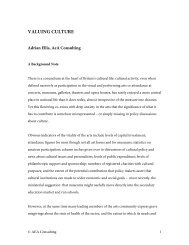Cultural diplomacy - Demos
Cultural diplomacy - Demos
Cultural diplomacy - Demos
You also want an ePaper? Increase the reach of your titles
YUMPU automatically turns print PDFs into web optimized ePapers that Google loves.
<strong>Cultural</strong> Diplomacy<br />
activity, each of which requires the involvement of a different<br />
configuration of actors: promoting a country’s national goals and<br />
policies (primarily national actors); communicating a nation’s ideas<br />
and ideals, beliefs and values (national and sub-national actors); and<br />
building common understanding and relationships (primarily subnational<br />
actors).<br />
Culture operates on all three levels. In the 1950s, US values were<br />
communicated through the individual art of Jackson Pollock (indeed<br />
its individuality was part of its diplomatic value), as much as through<br />
the rhetoric of the State Department. Today the US singer Toni<br />
Blackman is the US’s ‘Hip-Hop Ambassador’ and ice skater Michelle<br />
Kwan has been appointed as an official ‘American Public Diplomacy<br />
Envoy’. In the 1990s, music, art and fashion were all central to the<br />
global presentation of ‘Cool Britannia’.<br />
It is through culture that we find points of commonality and<br />
difference, and the means to understand one another. Exhibitions,<br />
performances and other cultural forms enable us to engage with<br />
others’ heritage and living culture. Outside Washington’s National<br />
Gallery, the Smithsonian Folklife festival provides visitors with<br />
experiences of different cultures, exemplified by musicians from<br />
Castro’s Cuba giving the US public a taste of the clubs and bars of<br />
Havana. That experience offered a contrast to more hostile images of<br />
Cuba that are common in the US media. Indeed, one of the most<br />
important contributions that culture can make to a country’s public<br />
<strong>diplomacy</strong> is its ability to showcase a diversity of views, perspectives<br />
and opinions, breaking down persistent national stereotypes and<br />
challenging the perception that a country’s political leaders and their<br />
policies are identical with the views of their citizens. This is<br />
particularly important when a country suffers reputational damage,<br />
such as that currently being experienced by the US and UK following<br />
the invasion of Iraq in 2003.<br />
The US provides a good illustration. Its response to unpopularity<br />
has been to assume that its position would improve if foreigners<br />
understood its policies better. This ignores the fact that many aspects<br />
of not just American government policy but also American values are<br />
26 <strong>Demos</strong>






